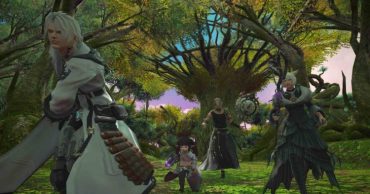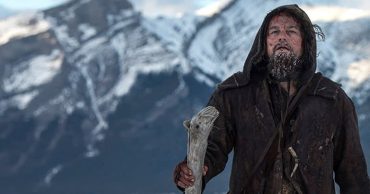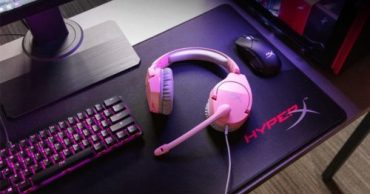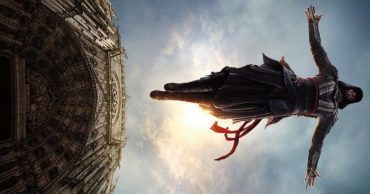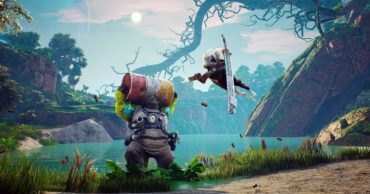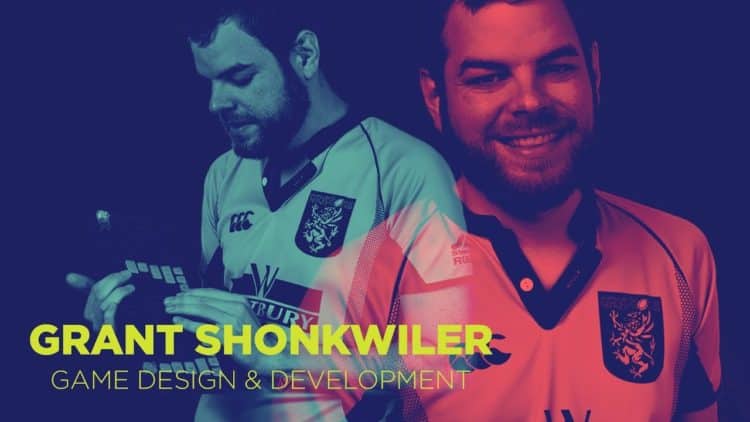
Grant Shonkwiler, known for his work on Fortnite, Doom, Rage, and a vast majority of other games, has had quite an active career in the game development industry for a pretty long time now. He graduated from Full Sail University and went right to work as a Game Programmer for Megatouch Games. Recently, I got the wonderful chance to sit down and talk with him about what it’s like working on games as big as Fortnite and Doom, as well as his own personal adventures as a consultant for a variety of developers. So, what is it like working in the world of video games? Grant tells us all about his experiences working in the industry!
You graduated from Full Sail University in 2008, and joined AMI Entertainment/MegaTouch Games as a games programmer, how was that transition going from college to being a full on games programmer right away?
Grant: “Yeah, it’s an interesting transition. Part of the reason that I went to MegaTouch – other than the fact that they offered me a job and getting your first job is really hard – is because a lot of people who worked there were Full Sail graduates, so in a lot of ways it was kind of like an extension of Full Sail. People thought the same way, they made games the same way that we did at Full Sail, and it was just transitioning to a professional environment. The first thing for me that was really hard was I wasn’t required to do a bunch of stuff outside of school. Full Sail’s intense, so you’re in school about 40 hours a week, and then you have to study on top of that and then do project and other stuff, so immediately I had a bunch of free time, which was new and exciting, but also the biggest part is that your code is now professional, right? So you don’t have teachers telling you to fix this, everything you’re doing – you’re accountable for. You do have other people who are obviously helping you as you move from junior to more advanced, but the responsibility and the ownership that I felt was almost immediate. Some people say that’s a lot more pressure, to me it felt like the extra responsibility was kind of exciting, it didn’t feel like a lot of extra pressure.”
After working at MegaTouch, you moved onto id Software, working on Doom as Producer for the AI, Character, and Narrative teams for a couple of years. What, if anything, about that position did you find to be the most eye-opening? What was the most challenging?
Grant: “Eye-opening, I would say the complexity of AI at that caliber of game development. I had made AI when I was working at MegaTouch, and it was very simple – not very complex – and so learning the complexities of the code and the way the AI is created for these massive AAA games, and especially in a game like Doom where the AI is so important, and the way that they interact with each other, but also they can get mad and fight each other, so the levels of complexity were really high there. On top of the quality of the characters themselves, and the number of polygons and the time spent on that was new. Challenging, you know Noclip did a really good documentary talking about a lot of the challenges that happened with the development of Doom, but I’ll talk about it in relation to the narrative team. There’s a lot of pressure when you’re working with really storied franchises, I mean, every gamer has played a Doom, and Doom is the reason that most game developers have jobs, so there’s a lot of internal pressure – on top of external pressure – but more importantly internal pressure to be something special [and] to make something great. That was a big challenge for us to figure out what that meant, and on the narrative team, the challenge is that most people aren’t going to talk to you about the story of Doom, but the lore of Doom is actually very, very deep. There’s a lot of complexities, there’s the hierarchy of the demons, the different organizations, and all these things, so trying to write a story that is compelling and interesting, but is fairly lightweight – there’s not a lot of cutscenes, most of it is optional, you either read it in the databanks or look at an echo, or whatever it might be, a lot of the story is optional, so how do we make sure the player gets enough story through gameplay and through the environment, so that they feel like they know what’s going on, but we’re not sticking them into 90 minute Kojima long cutscenes. So that was definitely a challenge, and something I learned a lot about.”
I see you’ve also worked on Fortnite for a couple of years, were you a part of the Battle Royale or Save The World side of things? A bit of both?
Grant: “I was on Save The World, Battle Royale started to gestate right when I left, so I did do some work on PvP and a mode outside of Save The World, that eventually morphed into Battle Royale, but most of my work was on Save The World.”
Once Battle Royale took over, it seems like Epic kind of put Save The World on the backburner. Did it kind of sting to know that all the work that you and your team put into Save The World kind of just got thrown to the side?
Grant: “Well, first off, it’s interesting to me that Epic hasn’t really talked about this much, but it sold well. It sold millions of copies, and then Battle Royale obviously took over, so it did well, it’s not like it did poorly, so I was excited about that. No, I don’t think it’s really bittersweet, I think that all the work that we did is the reason Fortnite is successful in Battle Royale. The reason that Battle Royale exists is because we spent all this time building out the world and the lore, the characters, and the pipeline, so the team that ended up building Battle Royale was able to come on and use all that stuff that was already made to build out this world. I wouldn’t say it’s bittersweet, games don’t have a long lifespan normally, so the fact that Save The World lasted about as long as most video games last, and then the fact that Battle Royale is still a thing is just awesome. I love that I’ve now worked on two games that are now part of the zeitgeist of humanity. Most people have heard of Doom, and I feel like everybody’s heard of Fortnite. I was in India a couple years ago, and I was wearing a Fortnite Dev Team t-shirt, and this kid came up to me and he was like ‘Fortnite?’ and I was like ‘Yeah’ and then he just said ‘PUBG’s better’ and then just walked away. I’m in like the middle of nowhere in India and this kid knows about Fortnite, so that was just mind-blowing to me.”
I see you were also Executive Director for the Game Developers Foundation from 2017-2020, where you helped “lead the next generation of game developers to their dreams, through scholarships and educational programs, focused on elementary-high school.” Are you still involved with this program in any capacity?
Grant: “So that organization – with COVID – it kind of fell by the wayside, so to speak. A combination of not getting the donations that we needed, and then people who were involved in it needing to really focus on their businesses – myself included – it kind of fell by the wayside. Really all that we ended up doing there was spending a lot of time just talking to people, most of the scholarships weren’t significant to the point where I would go tout them as paying some kid a full scholarship, but really it was giving us, the people who were involved in it, the opportunity to speak to specifically under-privileged youth around the world – we really focused on the US, but also around the world – and then also we got to speak to a bunch of non-profits in different cities, and then connect them. That was probably – if we look at the value of the organization as a whole – that was probably the most valuable thing is we would go and talk to somebody in Portland, and then we would talk to somebody in Orlando, and go ‘Oh, the two of you should be talking to each other and sharing your findings and discoveries with each other.’ Yeah, so it was an interesting thing, and something I’d love to get back to one day, it’s just the other people who are helping me run it, and myself, our businesses kind of became a priority there.”
Speaking of your business “Shonkventures,” can you tell me a little bit about what that is and what your goals for this business are?
Grant: “Yeah, so the irony is Shonkventures started when I left Epic. When you change your LinkedIn profile to “not having a job” you get inundated, right? So, I left Epic to take a six month sabbatical to do a little bit of writing, to travel the world, to do non game work, so the way that I made it so that I had a job, so people wouldn’t be sending me messages nonstop on LinkedIn, was I said “Oh, I’m on Shonkventures” and then Full Sail actually – I went to Full Sail to do an advisory board meeting – and on all of my nametags they put “Grant Shonkwiler: Shonkventures” and then they filmed a video with me and it said “Shonkventures” on it, so I was like ‘Well I guess I’m going to make a business now.’ So I registered with the government, and that’s around when I started working, and so it started out as just me doing a lot of education and teaching, so I wrote a couple books, and I was teaching leadership and doing leadership consulting, and then in about six months I realized I really missed making video games, so I started doing contract work as a producer and designer, so now I really have my business split into three main branches. So, the first one is contract work, where I’m either a producer helping lead a team or a designer on a project specifically. The second one is consulting, which is where I am working with an organization trying to help them expand, or higher new people, or they have a specific problem that they need solved, or I am doing coaching with their team in some way – their leadership team, their executive team. The third one is what I call education, which is the book writing business, and then speaking to students and speaking at conferences and stuff, but then there’s a weird bit that comes at the bottom there, which is I do a lot of work with investment companies and people who are trying to enter the game space, so what I do is educate them about the space. If they’re investors, I’m giving them information about the specific company they want to invest in, if they’re new and they want to come into the game space, then I’ll connect them with the people to help them build a new studio, or to outsource, and so that’s become a big part of my business as well. So, I kind of get to do three big different things throughout that, and it’s been really exciting.
So you’ve really been on just about every end of the game development industry, what has been your favorite part of it? Do you prefer to be a lead producer managing teams of a bunch of people, or would you rather just be off doing your own thing?
Grant: “Yeah, that’s a great question. I really like what I’m doing now, because I get to do a lot of different things, and every day I’m learning something new. One of my clients is an organization called “The Atlantic Council” and I’m working with them on bringing climate change messaging to games, so every day I’m talking to scientists and people that I would never normally interface with, and I’m learning from them. So, what I’m doing now I get to learn a lot of different things, if I were to go back to work for a studio, I think my sweet spot is teams of around 50 or 60. At Epic, I had my largest team of 200+ people, and that was a lot to hold in one’s brain, and you don’t remember everyone’s names, and you don’t have personal relationships, so teams of between 20 and 60 is where I really enjoy it the most. I feel like I have a significant impact, and I know everybody, and I know what’s important to them in their lives. I think that’s where – if I were to go back to working in a studio – I would go there, but right now the fact that I get to set my own schedule, I’m my own boss, and I get to work on a variety of different projects, I get to really explore and do a variety of different things. I think one of the hardest things about making video games is that you’re on a team for a long time making one game. I get to be on multiple teams, making multiple games, so I don’t get bored, which is a problem that I’ve had in my career, which is I’m on a team for a while working on a game and around three years, if we haven’t shipped it I get a little antsy. The nice thing about the way that I work now is if I start to get antsy, I just grab another client and start working on another game as well.”
What is your favorite game that you’ve worked on in the past, or currently?
Grant: “Oh, that’s a hard question. I think it really does come down between Fortnite and Doom. I think Doom – what I love about Doom 2016 specifically – is that we took a team, a studio, and a game through Hell to make that game. We iterated on a bunch of things, we tried a bunch of things, and I felt like I contributed a lot to that game from weapon designs, to helping with AI and story, to helping change the way that id Software makes video games. With Fortnite, I got to make something completely new, that’s not very often that you get to do that – I mean, Doom was a sequel, Rage was a first-person shooter, and at MegaTouch I was making a bunch of casual games, but Fortnite was like nothing else that existed, so that was really exciting. I think that’s probably my favorite game that I’ve worked on, because it was my favorite game to play. At one point outside of [Quality Assurance], I think I was one of the players who had the most hours in the world in that game when it was in alpha, just because I loved it. I would literally work all day on it, go home, and I’d be like ‘I kind of want to play Fortnite’ and I’d boot it up and play for a couple hours. So, I think I have to go with Fortnite.”
So, I guess that might answer my last question: what is your all-time favorite game to play? Maybe that you haven’t worked on.
Grant: “Haha, okay. My favorite game to play – I’m actually going to give you three answers here – actually I’m going to give you four. So, my favorite game of all time is the original Deus Ex, but I haven’t played it in a long time, I played it a bunch when it first came out. The games that I probably continue to go back and play are: Skyrim, I have a character that has done everything in the world and I’ve done hundreds of mods with that character, and so I’ve logged a ton of time in Skyrim. Far Cry 2 is – I like all the Far Cry games – but Far Cry 2, to me, is like the perfect version of Far Cry, it’s way more hardcore than the newer Far Cry [games], it’s punishing, it’s not forgiving, weapons explode in your hands, you die a bunch, and so me and a guy named Anthony Birch, we used to challenge each other to permadeath playthroughs, and we’d do really weird things like ‘oh you can only use knives and fire’ and so you’d have to use fire to get people to run at you, and you’d be hiding, and you’d jump out and stab them and stuff like that, so yeah, I spent a lot of time playing Far Cry 2. The game that I return to the most when I’m like ‘ah, I don’t know what I want to play’ and just need something to play is Faster Than Light: FTL. To me, that game is just the perfect blend of intense and relaxing, because it’s turn-based, so you can just kind of like pause it – well, it’s not so much turn-based – but you can pause the game, so that one gets played a lot.”
Thank you so much for taking the time to chat with me about your career, Grant, it was awesome getting to peek into the life of a game developer, and I hope we get a chance to speak again soon! If you are in need of the many services provided by Grant, you can find him and his business Shonkventures here!
 Follow Us
Follow Us
